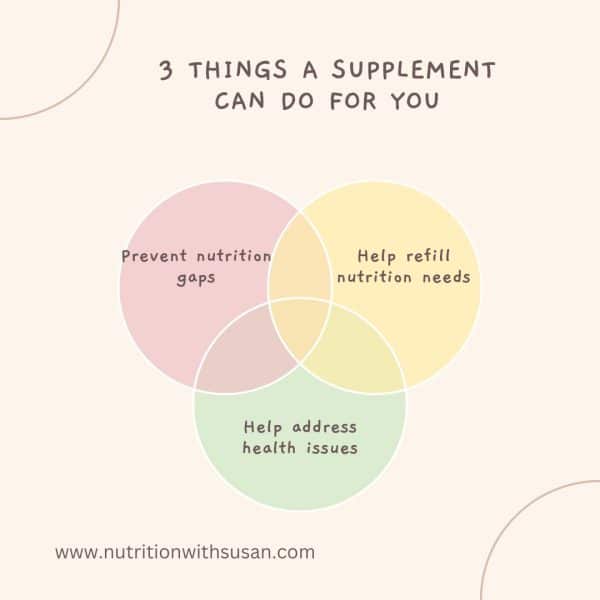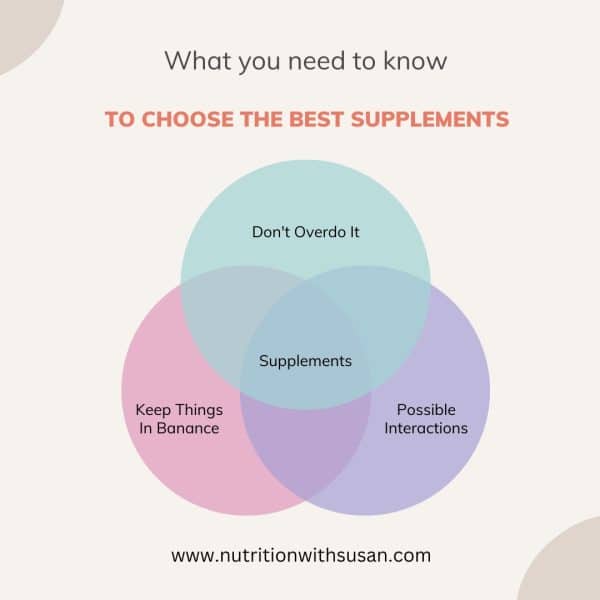To supplement or not to supplement — that is the question today. No supplement can replace a healthy diet — they’re called supplements for a reason! It supplements your everyday food and beverage choices. No supplement can undo poor nutrition choices.
However, supplements may be a good way to help you give your body what it needs to run better more often. We all want better health, and we know that better nutrition powers better health. Sometimes, diet alone just doesn’t cut it and you need a little more support.
But how to choose the best supplements? This post will show you what a supplement can do for you, how to choose the right supplement for your body, and things you should be aware of when choosing supplements. You’ll be armed with all the information you need to choose the best supplements to help your body be in the best shape it can be.

3 Things A Supplement Can Do For You
1 Help prevent nutrition gaps – we don’t eat perfectly, nor should we try to, as there is no perfect food, perfect diet, or perfect nutrition. We all have food preferences, and many of us choose to avoid foods and food groups.
We also may need to avoid certain foods. Better supplements are a way to get in the nutrients we may not get from our food.
Taking supplements can help make sure that you’re getting all the nutrients your body needs to stay healthy and strong. They’re also a great way to support your immune system, improve your energy levels, and aid in digestion.
Whether you’re looking to boost your overall health or manage a specific health condition, supplements can be a helpful addition to your daily nutrition routine.
2 Help (re)fill nutrition needs – our bodies use up nutrients all the time, so replenishing them is key to staying healthy, having better energy, and the tools the body needs to run better.
Whether you need more vitamin C to help boost your immune system or more iron to stave off anemia, supplements can help fill the gaps in your diet. However, it’s important to remember that they should be used in addition to, not in place of, a healthy and balanced diet.
3 Help address a health issue – whether taking medications or choosing to address health challenges with nutrients, better supplements can be part of your better therapeutic nutrition plan, ideally developed with your practitioner.
For example, if you struggle with joint pain, taking a glucosamine supplement may help to reduce inflammation and improve flexibility. Or, if you have difficulty falling asleep at night, taking a melatonin supplement can help to regulate your sleep cycle and promote more restful sleep.
Always share your current supplements (protein powders and herbal teas count!) with your practitioners and consult them before taking something new.
3 Things To Consider When Choosing A Supplement
1 Who are you right now? Your supplement choice(s) must be based on your current health, your current nutrition choices, and your current health goals. Your better supplement choices are the ones that help your body run better today!
2 What form works better for you? If you can’t swallow a pill, a tablet isn’t your better option. Today, there are so many options – chews, gummies, sprays, liquids, powders, capsules – to choose from.
Your better supplement is the one you will take more often.
3 Are the ingredients – active and other – going to give your body something better: it’s ok to enjoy junk food, it’s not better to take a junk food supplement.
Supplements are a choice we make to give our body what it needs to run better. If you make organic and non-GMO food choices, do the same for your supplements.
Avoid artificial colors, sweeteners, and chemical isolates as supplements, they won’t help your body run better.
Should You Choose Fortified Foods Over Supplements
Government efforts and food manufacturers’ goals are two reasons we have food product fortifications, unfortunately, these days neither of them is better. Government efforts are altruistic, trying to make it easier for all of us to get in key nutrients especially those implicated in chronic disease risk.
Food manufacturers’ efforts are to make it cheaper to sell you food they tell you is healthier. But it’s not better. Most food fortifications occur in products where the hyper-processing of ingredients has removed key nutrients.
The nutrients used in fortification are rarely the same form, same balance, or same quality that existed in the original food. Your Better Choice? Consume foods and beverages where ingredients are whole or kitchen processed and use the best supplements to complete your better total nutrition plan.

3 Things You Need To Know To Choose The Best Supplements
1 Don’t Overdo It – Yes, there is such a thing as too much of a good thing. Too much of any nutrient is not better for your body. It is much easier to get too much from supplements than from foods, so proceed with caution, especially when your supplement offers more than 100% of a nutrient you regularly consume in your foods.
Taking a supplement that provides more than 100% of a nutrient you regularly consume in foods can actually have negative effects on your health.
For example, excess vitamin A can cause liver damage, and too much iron can lead to constipation and even toxicity. So, it’s important to do your research and talk to your healthcare provider before adding any new supplement to your regimen.
Remember to always read the label and stick to the recommended dosage. Your body will thank you for it!
2 Keep Things In Balance – supplements can help prevent and fill nutrient gaps, but they can also create nutrient imbalances. That is NOT better! Your body uses nutrients together and also needs some to balance out others.
For example, folate and B12 are critical but your body needs enough B6 to prevent homocysteine production. Calcium and magnesium, like sodium and potassium work in opposition to each other, so if you get more of one nutrient it will increase your need for the other.
3 Don’t Forget About Possible Interactions – supplemental nutrients interact with foods, beverages, and medications… they even compete with each other!
For example, taking certain supplements along with prescription medication could result in adverse reactions that can be harmful. Even common foods and drinks like grapefruit or alcohol can interact with supplements in ways that could compromise your health.
To choose your best supplements, you need to consider everything that goes in and on your body most often to avoid interactions. By being informed, you can make wise decisions about your health and well-being.
Conclusion
In conclusion, taking a supplement can offer a variety of benefits such as boosting immunity, improving energy levels, and supporting overall wellness. But choosing the best supplement for your body can be overwhelming.
When selecting a supplement, it is important to do your research, consider your individual needs, and consult with a healthcare professional.
Look for supplements with high-quality ingredients that have been tested for potency and purity, and be cautious of any products that make unrealistic or exaggerated claims.
By following these tips, you can confidently choose the best supplements to support your health and wellness journey. Remember, your body is unique and deserves the best care, so take the time to choose the right supplement that meets your individual needs.
Looking for more personalized help to manage your inflammation or autoimmune issues? I can help! Check out my offerings and if it resonates with you, let me know. I’d love to work with you!
If you like this post, you may be interested in an article I wrote on “Immune Booster Supplements and Foods – Part I“. Here’s a little sample for you to check out.
Also known as the sunshine vitamin, Vitamin D is a fat-soluble vitamin stored in your body’s fat cells. Its anti-inflammatory and immune-boosting properties make it a critical nutrient for immune support.
Studies have demonstrated Vitamin D’s ability to enhance macrophage and T-cell function to help protect you from viruses and other pathogens.
Low levels of this vitamin have been associated with an increased risk of respiratory diseases such as asthma, tuberculosis, COPD, and other viral infections.
Sources of Vitamin D are:
- Cod Liver Oil
- Fatty Fish like Tuna, Salmon, and Sardines
- Beef Liver
- Fortified Cereals and Dairy
- Egg Yolk
It’s always a good idea to get a blood test to check if your Vitamin D levels are low, as you may require a much higher dose to reach optimal blood levels of this vitamin.
For most people supplementing with 1000-5000 IU of Vitamin D is sufficient. Optimal levels range from 75-150 nil/L.
***Disclaimer: This post is for informational purposes only and should not be construed as medical advice***


